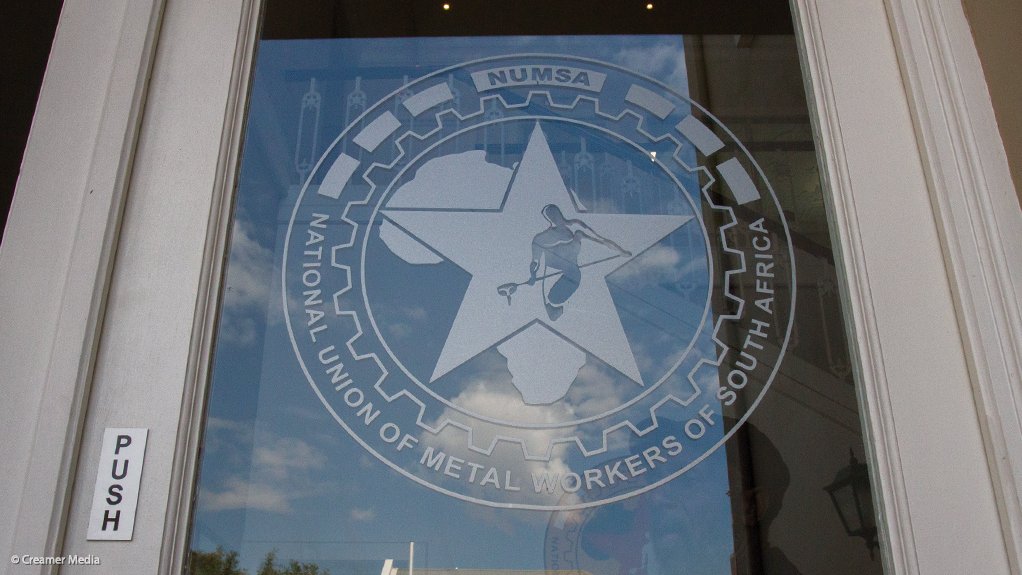Labour union, the National Union of Metalworkers of South Africa (Numsa) plans to, later this month, mobilise labour and about 230 civil society organisations in mass protest action in Pretoria and Cape Town against escalating corruption in government and the private sector.
Union president Andrew Chirwa said Numsa had served its 14-day notice to the National Economic Labour and Development Council (Nedlac) to lead simultaneous marches on September 30 to the Union Buildings, in Pretoria, and to Parliament, in Cape Town, to deliver a list of demands aimed at battling and rooting out corruption and ensuring that those responsible were held accountable.
Numsa, which had called a press briefing to announce its plans at the union’s headquarters in the Johannesburg central business district on Tuesday, teamed up with coalition Unite Against Corruption to encourage participation in the “socioeconomic strike” with a mass national work stoppage, rallies, marches, demonstrations and lunch-hour pickets.
The planned strike was also endorsed by two major federations, namely the Federation of Democratic Unions of South Africa and the National Council of Trade Unions, as well as certain Congress of South African Trade Union- (Cosatu-) affiliated unions, independent trade unions and civil society formations, besides others.
This was just the beginning of the battle against corruption and the need for accountability by those that had cost the country thousands of jobs and R700-billion over the past two decades, former Cosatu general secretary Zwelinzima Vavi said.
Armed with several demands, Numsa and its supporters would call on the National Treasury to compile a report on all organs of State that failed to comply with South Africa’s local procurement legislation.
“Corruption robs us of jobs and it undermines existing ones,” Chirwa said, pointing out that 72% of the State-owned firms audited in 2013/14 were found to be noncompliant with tender procedures, citing the Passenger Rail Agency of South Africa’s contracts with foreign firms, which had allegedly cost nearly 250 jobs.
Further, the union demanded that the South African Revenue Service, the South African Reserve Bank and the Financial Intelligence Centre (FIC) investigate illicit financial flows, transfer pricing and money laundering in the country amid close to $30-billion of reported illegal outflows in 2012.
South Africa’s anticorruption laws, including the Prevention and Combatting of Corrupt Activities Act, the Prevention of Organised Crime Act, the Protected Disclosures Act and the Criminal Procedure Act needed to be strengthened.
In addition, Numsa wanted the publication of all forensic audits of potential maladministration and irregularities undertaken in terms of the Public Finance Management Act and the Municipal Finance Management Act.
The strengthening of the Public Protector’s offices and the office of the Auditor-General (AG), as well as that of anticorruption institutions, such as the Directorate for Priority Crime Investigations, more commonly known as the Hawks, the Special Investigating Authority, the FIC and the National Prosecuting Authority (NPA) and its specialised units, had also emerged as priorities for the union.
“Corruption takes away resources from the provision of basic services meant for the working class. Resources that go down the corruption tube could be used to deliver basic socioeconomic services and provide adequate housing, basic education, healthcare services, water, social welfare and basic nutrition for children,” Chirwa said.
In light of this, Numsa demanded a probe on the effect of corruption on the delivery of socioeconomic services, and an end to the popular “golden handshakes” provided to silence people or to remove those seen to be fighters of corruption.
“We [also] demand an investigation of how lifestyle audits can be used to find out those who live beyond their means and fraudulently,” Chirwa said.
Lastly, Numsa requested the formation of a multidisciplinary team made up of the NPA, the Priority Crimes Litigations Unit, the South African Police Services’ Hawks unit, the Office of the Public Protector and the AG to investigate economic crimes committed under apartheid from 1980 to 1994.
EMAIL THIS ARTICLE SAVE THIS ARTICLE
To subscribe email subscriptions@creamermedia.co.za or click here
To advertise email advertising@creamermedia.co.za or click here











